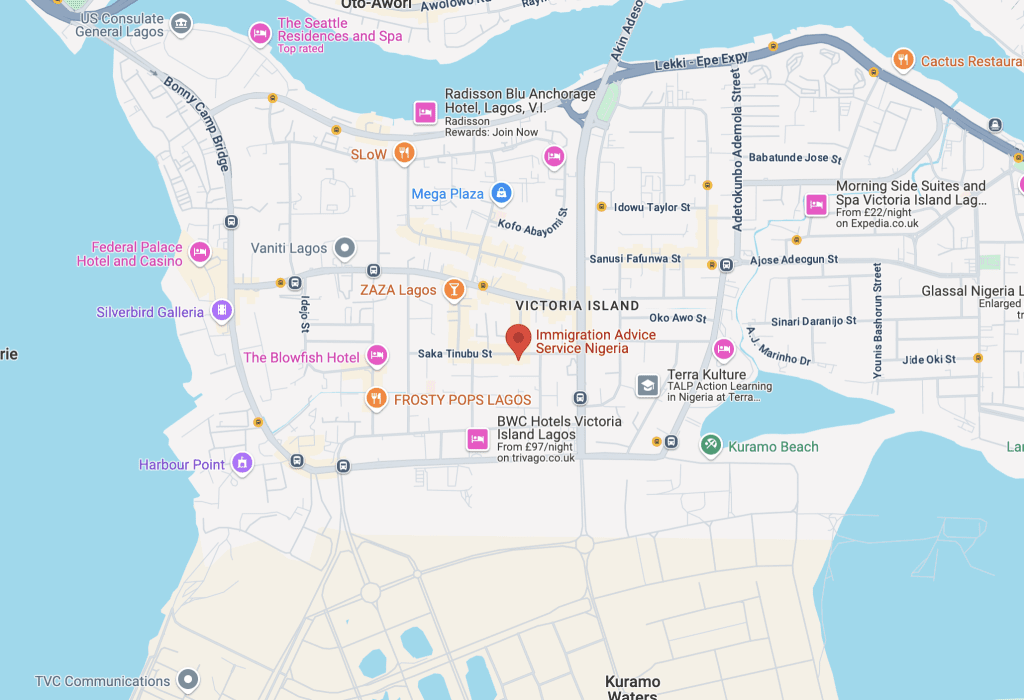Asylum in the UK for Nigerians
If you have fled from Nigeria and are seeking protection in the UK, you can apply for asylum and get refugee status.
For more information about how to claim asylum in the UK, including eligibility requirements for asylum seekers and how we can help you get started with your application process, contact one of our legal advisers today. Call us at our office in Nigeria on +2342013438882 or our UK office on +44 (0) 3316300929. You can also reach out to us online.
Read our 1001 reviews
Request a call back from our immigration experts
Immigration Advice Service Nigeria




Get in Touch
Benefits of Choosing IAS for your Asylum Claim
Obtaining asylum in the UK can be a stressful process. However, IAS’s experienced and reliable immigration lawyers can help you and be your source of support every step of the way.
When getting in touch with us for help with your UK asylum claim, you will:



Receive full, hands-on support from a qualified asylum lawyer to assist with your case.



Be fully briefed on the intricacies of the UK asylum system and what you can do to successfully claim asylum.



Benefit from expert legal representation to fight for your case on your behalf.



Continue to receive support from your lawyer in the event of any complications or refusals.
Services we Provide
Are you a Nigerian Seeking Asylum in the UK?
Contact us to get advice from our experienced immigration lawyers. We will work with you to ensure your application meets the Home Office requirements and that there are no risks of refusal. We have the expertise and resources and helped many Nigerians with their asylum application in the past.
Nigerian Emigration
For Nigerian emigration matters, please call +44 (0) 3316300929 or +2342013438882.
Other Immigration and Emigration Matters
For immigration/emigration to/from other countries, please call:
US – +1 844 290 6312
Ireland – (+353) 061 518 025
UK – (+44) 333 4149244
Overview of Asylum in the UK for Nigerians
Asylum is a protection and not a status. Asylum seekers are people who have fled Nigeria and are seeking protection in the UK. Many asylum seekers UK will go through the asylum process to get refugee status.
The 1951 Refugee Convention identifies categories of people eligible for UK asylum: those who are being persecuted because they belong to a particular social group, were born in a certain country or on political grounds. Asylum is granted based on need alone.
A refugee may be granted asylum in another country if they have left their country and cannot return for fear of persecution (and if the authorities in their country of origin won’t protect them).
To claim asylum in the UK, the people seeking asylum must prove that the persecution they face is genuine. You will not be sent back to your home country while the Home Office decides on your claim.
Roles of the Home Office and Immigration Authorities
The Home Office will work with other UK government departments to assess each as asylum case. Authorities will decide the following:
- Whether or not someone has a right to enter the UK
- Type of leave to remain if someone is given the right to stay
- Appeal against asylum decision and if so, on what grounds
- Requests for citizenship from people who are settled in the UK.


What Essential Documents Can Strengthen Your Claim?
People seeking asylum must prove their nationality and identity by providing documents, such as birth certificates or national identification cards. If you do not have these documents, you may be able to provide other forms of evidence, such as affidavits from friends or family members who can vouch for your identity.
Asylum seekers will also need to provide documents for any countries that they have already left. This helps prove that people seeking asylum have been a citizen or legal resident in another country, which can go towards proving that there has been persecution against them.
It may also be needed to provide documentation proving previous status within the country of origin. For Nigerians, examples of this might be school records or medical records.
Asylum seekers must have these documents because they can help protect them against deportation. If people seeking asylum do not have enough evidence for their application to seek asylum in the UK, then the Home Office can refuse their case.
You can contact our IAS asylum lawyers who are familiar with other services that may be able to help you.
What Is the Importance of Seeking Legal Advice and Representation?
When you’re claiming asylum in the UK, it is essential to make sure you’re getting the help and representation you need. Seek out an immigration lawyer or someone who specialises in helping people to apply for asylum in the UK and assist with immigration issues.
Our experienced lawyers can point you toward organisations that can help you get the support you need while handling your immigration case.
It’s probably best not to wait until you’ve been denied asylum before getting some professional legal advice, but if that seems like your situation, don’t hesitate to reach out to our lawyer who can help.


Asylum Requirements and Procedures
What Are the Asylum Requirements in the UK?
For someone entering the UK and hoping to seek asylum, it’s best to know the specific requirements that must be met under UK law. A person seeking asylum in the UK will be asked to provide certain documents, including:
- Physically present in the UK at the time of making your application for asylum
- Proof of identity
- Travel documents
- Evidence regarding their reasons for seeking asylum, such as membership of a particular social group
- Proof of security concerns arising from the country of their origin
What Is the UK Asylum Application Process?
The application process can take up to six months, during which time people seeking asylum will be accommodated by one of several organisations.
During this waiting for a decision period, people who apply for asylum will also receive a small amount of financial assistance as well as access to food and clothing vouchers.
People who apply for asylum may be granted an interview with a caseworker, after which the Home Office determines whether to grant them refugee status or not. If you are found to be a refugee, you will receive a letter extending your stay in the UK for 12 months.
If your asylum application is denied, you may seek legal assistance. IAS-qualified lawyers will ensure that all documents are filed correctly and on time. If there are any errors or missing documents, our immigration lawyers can help resolve them.
Can Asylum Seekers Work?
Asylum seekers in the UK can work if they have been granted leave to remain. An asylum seeker will be given the right to work if they meet one or more of the following criteria:
- You have made a successful asylum claim, humanitarian protection or discretionary leave
- Your asylum claim has not been finally determined or refused
- You have been granted limited permission to stay or leave to remain as a refugee


How Does Asylum Appeal Work in the UK?
The first step in the UK asylum process is to apply for asylum within the country of arrival. If you are not eligible to seek asylum, you will be given a timeframe to leave its borders or risk deportation.
You can appeal by applying to the First-tier Tribunal. The appeal process involves multiple steps and can take more than a year.
An appeal can only be based on new facts or evidence that were not available at the time of the initial application or because of legal errors made. New facts or evidence could include:
- Persecution details
- Identity documents (if details provided in the original application were false)
- Information about reasons behind flights from home country
Once submitted, a case manager will review your application and decide whether it has merit. If it does, a hearing will be scheduled.
If you’ve been refused asylum and think that you have a good case, it’s important to get in touch with our immigration lawyers before you appeal. We can review your application and give expert advice on how to strengthen it. We can also help with preparing witness statements and finding new evidence to support your claim.
People Seeking Asylum and Refugees – Who’s Who?
The terms asylum seekers and refugees are often used interchangeably, but they are different. Asylum seekers can request asylum in a country but whose claim has not yet been decided upon by the government.
People seeking asylum are often placed in camps when they arrive in a new country. If their status is approved, they can apply for resettlement or citizenship. If their status is denied, they must return to their home country or risk deportation.
As a refugee, you will tend to apply for asylum in the UK before you enter the country. Those granted refugee status will be issued a UNHCR Refugee Certificate, which grants them refugee status in line with the 1951 Convention Relating to the Status of Refugees and the 1967 Protocol.


How Can IAS Help?
Seeking legal assistance from our experienced and sympathetic immigration lawyers will simplify the asylum application process and minimise your chances of being denied. Our immigration lawyers have extensive knowledge of the asylum requirements.
We will help you to fill out the asylum applications. Our experienced lawyers will ensure that your documents are in order and that you meet the requirements by the deadline. Our immigration lawyers will help you claim asylum in the UK.
For more information about what qualifies as an asylum case and how it works, our legal team can help. If you are a Nigerian seeking asylum in the UK, our expert lawyers can prepare your asylum application if your situation meets specific criteria. Call us at our office in Nigeria on +2342013438882 or our UK office on +44 (0) 3316300929. You can contact us online.
Table of Contents
Table of Contents will appear here.Legal Disclaimer
The information provided is for general informational purposes only and does not constitute legal advice. While we make every effort to ensure accuracy, the law may change, and the information may not reflect the most current legal developments. No warranty is given regarding the accuracy or completeness of the information, and we do not accept liability in such cases. We recommend consulting with a qualified lawyer at Immigration Advice Service before making any decisions based on the content provided.
Frequently Asked Questions
If you’re an asylum seeker and want to appeal a decision made by the Home Office, you need to apply within 14 days of receiving a letter with information about your case. You should include the letter you received, any supporting documents, and a cover letter. You will be able to apply for asylum support using form ASF1 (available on GOV. UK).
The asylum seeker interview is a significant step in the asylum process. Asylum seekers must attend an interview to prove they have fled their country of origin to escape persecution.
People seeking asylum will talk to an immigration officer about why they have come to the UK and what happened in their country of origin. The Home Office will decide on whether or not asylum seekers will be given the right to stay in the UK.
The asylum process can be lengthy due to several factors, including:
- How long it takes an applicant’s case to be referred to the Home Office by either the police or another agency that has responsibility for looking into abuse allegations
- The time it takes to arrange an interpreter and interview the applicant once their case is referred by the appropriate authority
- A large number of cases are submitted each year due to political unrest and other humanitarian crises
- How long it takes for applicants who arrive without documentation to provide information about themselves and family members


What our clients are saying
How our UK Immigration Lawyers can help
At the Immigration Advice Service our lawyers specialise in a wide range of UK visas, nationality and asylum applications and have represented clients in various successful complex and high-profile cases.



















